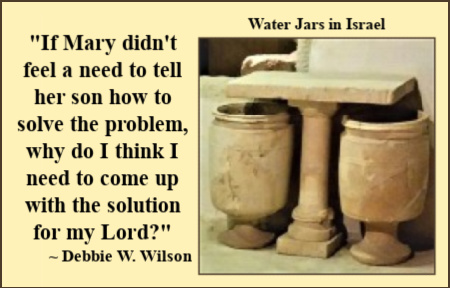When You Face a Problem, Follow Mary's Example
Debbie W. Wilson is one of two women I know who says so much in few words. In this Faith and Obedience UPGRADE, she points to a woman in the Bible who was a perfect example of how we can face everyday problems or problems that seem incredibly daunting.
Debbie says, "What do you do when you come up against an unexpected or impossible problem? Try to fix it, panic, or call for help? Mary, the mother of Jesus, models how I want to act."
 When problems come, I (Dawn) tend to be a "fixer." I say, "I can handle this."
When problems come, I (Dawn) tend to be a "fixer." I say, "I can handle this."
But how many times, I wonder, might Jesus have handled it differently? How many times have I short-circuited what He wanted to do in a situation. He still works, but do I get the glory, or Him? Debbie challenges our perspective.
Debbie continues . . .
At the beginning of His public ministry at age thirty, Jesus attended a wedding at Cana. Mary must have been helping at the wedding. When the wine ran out, she brought the problem to Jesus. You can read the account here: John 2:1-11.
Mary said to Jesus, “They have no more wine.”
That’s it.
No pleading, no explanation of how embarrassing or urgent this was, no pointing out how this might foster faith in His disciples. Just, “They have no more wine.”
To the servants she said, “Do whatever He tells you.”
Jesus told them to fill the ceremonial washing jars with water. They filled six 20-30-gallon jars to the brim.
“Now draw some out and take it to the master of the banquet,” He said.
I smile when I read this.
Did the servant hold his breath when the host tasted the water?
I picture his eyes sparking with relief when the master proclaimed, “Everyone brings out the choice wine first and then the cheaper wine after the guests have had too much to drink; but you have saved the best till now.”
Personal Applications
1. Tell Jesus the problem—not the solution.
When I bring my problems to God, I often suggest ways to solve them.
There is nothing wrong with asking. But did you notice, Mary didn’t tell Jesus how to fix the problem? How could she?
Jesus did something that defied imagination.
When I focus on how I think He should act, I miss the work He is doing.
2. Follow His instructions and leave the results with Him.
Mary didn’t supervise Jesus’ actions. She told the servants to do what He said.
I’m sure His directions didn’t make sense to them. Because they obeyed, they experienced a miracle.
Trust Jesus with My Problem
Mary knew Jesus’ compassion. She trusted His love, wisdom, and ability.
- Perhaps Jesus had miraculously multiplied food for His family in the meager years after Joseph died.
- Satan knew Jesus could turn a stone into bread (Matthew 4:3).
After Mary told Jesus about the need, she left the problem in His capable hands.
If Mary didn’t feel a need to tell her son how to solve the problem, why do I think I need to come up with the solution for my Lord? I only need to trust and obey Him.
I can’t see His spiritual power at work anymore than I can see the wind.
But when I trust Him, I witness the result.
How can you apply Mary’s example to a problem you’re facing?
 Debbie W. Wilson, drawing from her walk with Christ and decades as a Christian counselor and Bible teacher, mixes insight and encouragement to inspire readers to trust Christ with their lives. Her books include Little Faith, Big
Debbie W. Wilson, drawing from her walk with Christ and decades as a Christian counselor and Bible teacher, mixes insight and encouragement to inspire readers to trust Christ with their lives. Her books include Little Faith, Big God, Give Yourself a Break, and Little Women, Big God. She and her husband Larry founded and run Lighthouse Ministries, a nonprofit biblical counseling, coaching, and Bible study ministry. Find free resources to refresh your faith at debbieWwilson.com.
God, Give Yourself a Break, and Little Women, Big God. She and her husband Larry founded and run Lighthouse Ministries, a nonprofit biblical counseling, coaching, and Bible study ministry. Find free resources to refresh your faith at debbieWwilson.com.
Photo of Stone Water Jars from Land of Israel Tours.
 Post a Comment → Posted on
Post a Comment → Posted on  Thursday, April 29, 2021 at 11:00AM
Thursday, April 29, 2021 at 11:00AM  Debbie W. Wilson,
Debbie W. Wilson,  Jesus at Cana Wedding,
Jesus at Cana Wedding,  Mary at Cana Wedding,
Mary at Cana Wedding,  Obey and Leave Results to Jesus,
Obey and Leave Results to Jesus,  Problems,
Problems,  Struggles,
Struggles,  Tell Jesus your problem,
Tell Jesus your problem,  Upgrade with Dawn Upgrade Your Life
Upgrade with Dawn Upgrade Your Life  Faith,
Faith,  Obedience
Obedience 






